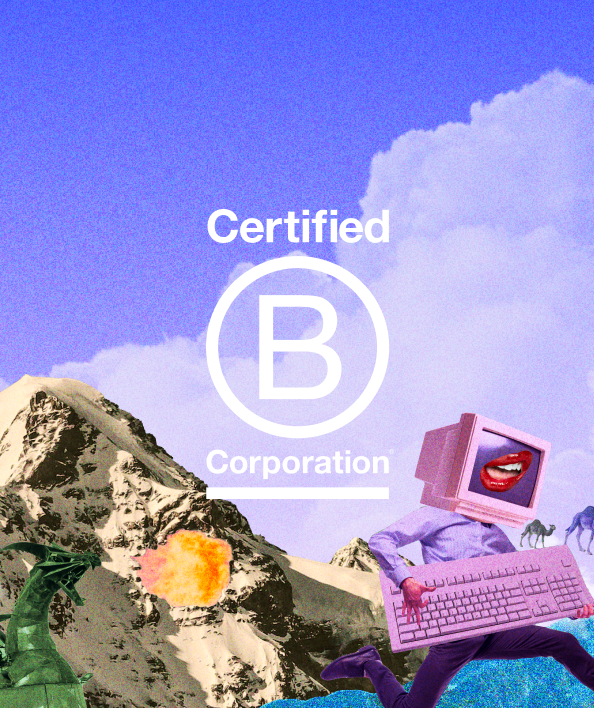Ever been kept awake at night worrying about the future of the planet? You’re not alone. Eco-anxiety and climate despair are real. So what action can businesses take on climate change? This article talks about how BlueRock, and businesses more broadly, can work towards a more sustainable planet and business operations.
Our individual impact can sometimes feel futile, and it’s no different for SME businesses. So how do we make a difference?
BlueRock’s Carbon Neutral Progress
BlueRock is working on measuring its greenhouse gas emissions (CO2e, carbon dioxide equivalents) to understand where we are having a detrimental impact on the planet. Our next steps are annual measurement and taking proactive climate action decarbonisation steps to reduce our emissions.
This is a continuous loop between changing suppliers, changing behaviours, reducing our waste and improving our data collection processes for more accurate emissions measurement. Some of BlueRock's previous decarbonisation actions include changing energy supplier, sourcing coffee from certified sustainable growers and stocking our drinks fridge with products from B Corp certified businesses. We are continuously improving.
Using Business as a Force For Nature Through Sustainability
As international pressure grows for the global economy to transition to a net-zero future, businesses are increasingly held accountable for their greenhouse gas emissions. Reducing your organisation’s emissions allows you to stay ahead of the curve and take meaningful and direct action to mitigate the global climate crisis.
Mandatory Reporting is Coming
Business owners, now is the time to take action. As of 1 July 2024, there will be mandatory reporting requirements for large Australian businesses. Australia has taken some giant leaps for national sustainability with new Carbon Emission reporting obligations. Organisations will soon need to disclose climate-related financial information based on the ISSB (International Sustainability Standards Board) standards being introduced.
Group 1 entities starting 2024-25 onwards are large companies with two of these three conditions: 500+ employees, $1b+ gross assets or $500m+ revenue.
Compliance requirement or not, customers, staff and the public want businesses to measure and publicly report on their climate impact. By measuring and managing your carbon footprint, your business not only contributes to a greener planet but also attracts eco-conscious consumers and investors. It's time for your business to start a carbon emissions ledger.
What is Decarbonisation, Carbon Neutral and Net Zero?
Carbon neutral certified businesses are declared to have measured, reduced, and compensated for all of its emissions from making and delivering its products and services.
Carbon neutral means reducing emissions where possible and compensating for the remainder by investing in carbon offset projects to achieve net zero overall emissions. Offsets are generated from an activity that prevents, reduces or removes greenhouse gas emissions from being released into the atmosphere.
Net zero means no carbon was emitted as a result of an activity.
To be able to reduce and offset your emissions, you have to understand and measure how many tonnes of carbon dioxide equivalents (CO2e) your business is producing. Companies consider Scopes 1-3 of emissions and this is where calculations require accounting skillsets. A majority (~80%) of a company's emissions come from 'scope 3' indirect supply chain emissions - this includes the goods and services companies purchase and invest in, which the business might not own or control.
Consider travel, commute, catering, paper, waste, investments, technology including hardware and software - these all emit scope 3 emissions.
Scope 1 (direct emissions) include vehicles, duel, heating, cooling, fridges, gas. Scope 2 (indirect emissions) is emissions from purchased electricity. The GHG Protocol is the gold international standard around the world for greenhouse gas (GHG) carbon accounting and reporting standards.
Case Study: Even Coldplay is Doing This!
Coldplay is pioneering sustainability efforts in the music industry with their Music of the Spheres World tour, being the first in the industry to release a Sustainability Report accounting for their tour’s emissions and climate impact. Check out their interactive report here .
In the first year of the tour, Coldplay cut down their direct emissions by 47% compared to their 2016-2017 tour. Coldplay acknowledged;
“This is a good start – and something that our incredible crew should be very proud of – but clearly there’s still room for improvement. Now that we’re into the second year of the tour, we’ve started to run the entire show (audio, lights, lasers etc) from an electric battery system that allows us to use 100% renewable energy as efficiently as possible. We have been using electric vehicles and alternative fuels wherever we can, as well as reducing waste and plastic usage to a minimum.”
By sharing their story in an open and honest way, and bringing along their fans for an unforgettable experience, Coldplay is inspiring positive change.
Get in Touch For Help With Your Business’s Impact
BlueRock is all in on this sustainability and carbon accounting journey. We’re also committed to maximising our impact, and that of our clients, through the Be BlueRock Foundation and our Philanthropy Advisory Services . Will your business join the journey and take climate action with us? Get in touch for a consultation.




